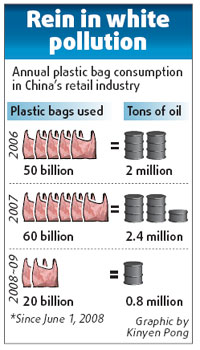The strategy is to attack the countryside from the cities rather than the other way round, as was the case during revolutionary times.

And the reason for that is simple: cities seem to be winning the war against plastic bags that the government declared on June 1 last year. Free distribution of plastic bags was banned a year ago to save energy and protect the environment.
But while cities handed out 65 to 70 percent fewer plastic bags during the past year, rural areas saw little change in the pattern.
So to take the battle to villages in right earnest, the State Administration of Industry and Commerce (SAIC) has promised to enforce the national regulation more strictly and not to let offenders go scot-free. Officials of China's market rule enforcer said shopkeepers and vendors giving free plastic bags could be fined up to 10,000 yuan ($1,470).
According to the National Development and Reform Commission (NDRC), the country's top economic planner, about 1,300 tons of crude oil is needed just to make plastic bags given out by supermarkets in China per day.
The ban saw the country's retail industry use 20 billion plastic bags from June last year to the end of this month against 60 billion in the 2007 calendar year, according to China Chain Store and Franchise Association. The massive drop means a saving of 1.6 million tons of crude.
Wal-Mart's 106 stores in China reportedly distributed 80 percent fewer plastic bags in the past year, and IKEA Beijing claimed to have cut its use by 67 percent.
French retail giant Carrefour's plastic bag use fell by 70 percent in China, an executive said. About 60 percent of Carrefour's customers are middle-aged or elderly people who are in the habit of carrying eco-friendly bags or reusing plastic bags.
Young people, however, still tend to buy plastic bags because they think it is convenient and doesn't cost too much, she said.
Bag style
The style and design of environmentally friendly bags has a lot to do with making people use them. Su Wei, who works for a Beijing-based entertainment company, said she loves carrying her eco-friendly bag to work, as well as for shopping.
"It's very special because it has my fashion icon Lin Chi-ling, China's Kate Moss," she said proudly. "Look, how cute she looks." Cute or not, the bag certainly has helped her stop using plastic bags.
But Zhang Chi, a 25-year-old journalist, hasn't got any "cute" eco-friendly bag. "I have dozens of cloth or other fabric bags at home received from shops or at commercial events. But I seldom use any of them because they are ugly and not convenient to carry around."
Rural market
A recent survey by Beijing-based non-governmental organization Global Village showed nearly 80 percent of people support the ban on free plastic bags. But the survey, which polled 2,500 people, also found that more than 80 percent of retail outlets in rural areas ignored the ban.
Wen Hengfeng, project manager of Global Village, said: "It's easier to monitor supermarkets but the countryside is a different proposition."
The SAIC helped employ 600,000 regulators since March to inspect 250,000 retail stores or markets for free plastic bags and non-eco-friendly bags. About 2,000 cases were investigated and 2 million yuan of fines imposed.
(China Daily May 30, 2009)